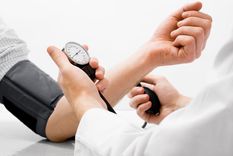
What causes hormonal imbalances?
A hormonal imbalance occurs when you have too much or too little of one or more hormones. While fluctuations in hormone levels are expected during lifestyle events like puberty, pregnancy, or menopause, hormonal imbalances caused by other factors can disrupt the normal function of your body and result in a range of unwanted symptoms.
In this guide, we explore the common symptoms of unbalanced hormones in both males and females and explore common causes of hormone irregularities and treatment options.
What is a hormonal imbalance?
A hormonal imbalance is when you have too much or too little of one or more types of hormone circulating in your body. Hormones are chemicals produced by glands in the endocrine system that are released into your bloodstream. They are responsible for many body processes, including the regulation of your appetite, metabolism, sleep cycles, reproductive cycles, sexual function, body temperature, and mood.
Hormone levels naturally fluctuate at various life stages, such as puberty, pregnancy, breastfeeding, and menopause. This is perfectly normal, but more longstanding hormonal imbalances can cause various problems and health conditions. The reasons for hormonal imbalances can include various lifestyle factors, health conditions, tumours, and certain medications.
Signs and symptoms of a hormonal imbalance
Hormones play a significant role in your health. As a result, there is a broad range of symptoms of unbalanced hormones, and those you experience will depend on which hormones are out of balance in your body.
Some common symptoms of hormonal imbalance in men and women include:
- Weight gain
- Unexplained and sometimes sudden weight loss
- Fatigue
- Muscle weakness
- Muscle aches, tenderness and stiffness
- Pain, stiffness or swelling in your joints
- Increased or decreased heart rate
- Sweating
- Increased sensitivity to cold or heat
- A change to bowel habits (constipation or increased bowel movements)
- Frequent urination
- Increased thirst
- Increased hunger
- Decreased sex drive
- Depression
- Nervousness
- Blurred vision
- Infertility
- Thinning hair
- Dry skin
- Puffy or rounded face
Many of these symptoms are nonspecific and can indicate other chronic health conditions. So, if you are concerned about any symptoms you’re experiencing, it’s a good idea to speak to your doctor or book a private GP consultation.
Signs in women
Due to natural fluctuations in hormones during a woman’s lifestyle, like those experienced during puberty, the menstrual cycle, pregnancy, breastfeeding, and menopause, women can be more prone to hormonal imbalances than men.
As a result, in females, some additional common signs of unbalanced hormones can include:
- Problems with periods – including missed, irregular, stopped or frequent periods
- Excess hair on the face, chin or other parts of the body, known as hirsutism
- Acne on the face, chest or upper back
- Hair loss
- Hyperpigmentation, usually along neck creases, the groin and under the breasts
- Skin tags
- Vaginal dryness
- Thinning of the vaginal wall (vaginal atrophy)
- Pain during sex
- Night sweats
- Headaches
Signs in men
In males, the testosterone hormone plays an important role in the normal functioning of the body. As a result, testosterone imbalances can cause a range of specific symptoms in men, including:
- Development of breast tissue, known as gynecomastia
- Breast tenderness
- Erectile dysfunction
- Decrease in hair growth
- Loss of muscle mass
- Loss of bone mass, known as osteoporosis
- Difficulty concentrating
- Hot flushes
Although testosterone balances are most common in males, they can and do sometimes occur in females.
What can cause a hormonal imbalance?
The causes of a hormonal imbalance are vast and can differ depending on which hormones or glands are affected. Some common causes include:
- Hormone therapy
- Medications
- Cancer treatments like chemotherapy
- Tumours, this can include both cancerous or benign tumours
- Pituitary tumours
- Eating disorders
- Stress
- Injury or trauma
In women, hormonal imbalances can also be closely linked to reproductive hormones, so common causes of imbalances can also include:
- Menopause
- Primary ovarian insufficiency, also known as premature menopause
- Pregnancy
- Breastfeeding
- Polycystic ovary syndrome (PCOS)
- Hormone medications, like contraceptive medications
Additionally, certain health conditions can contribute to hormonal imbalances, even if a hormonal imbalance was the initial cause. This includes:
- Type 1 and type 2 diabetes
- Diabetes insipidus – a rare condition where your conditions are unable to conserve water
- An underactive thyroid, known as hypothyroidism
- An overactive thyroid, known as hyperthyroidism
- Cushing disease
- Addison’s disease
How to treat a hormonal imbalance
The treatment for unbalanced hormones depends on the cause, so it is essential to first diagnose the hormone that is out of balance and then determine what is causing it.
Diagnosing a hormonal imbalance
There is no single test clinicians can use to diagnose a hormonal imbalance. Instead, they will begin by learning more about the symptoms you’ve been experiencing, how long you’ve been having them, and more about your general health status. This will help them narrow down which diagnostic tests may be most useful.
Common tests used to diagnose hormonal imbalances include:
H4 Blood test
Many hormones can be detected in the blood, so analysing a sample of your blood can provide insights into whether your levels are within the normal range. Common hormonal blood tests include those to check your thyroid, oestrogen, testosterone and cortisol levels.
Pelvic exam
In women experiencing hormonal imbalances, a pelvic examination can help rule out any unusual lumps, cysts or tumours that may be causing hormonal imbalances.
An examination of the scrotum in men can help rule out lumps or abnormalities that may be the underlying cause.
Ultrasound
An ultrasound machine uses sound waves to provide images of what is going on inside your body. For people experiencing symptoms of hormonal imbalance, an ultrasound of the uterus, ovaries, testicles, thyroid, or pituitary gland may be requested.
Other tests
More advanced tests sometimes used in the diagnosis of hormonal imbalances include:
- Biopsies
- MRI scans
- X-rays
- Thyroid scans
- Sperm count test
Treating a hormonal imbalance
Once a hormonal imbalance has been diagnosed, the treatment will depend on the underlying cause. Some common treatments include:
Oestrogen therapy
Women experiencing hot flashes or other uncomfortable symptoms of menopause may be recommended to take a low dose of oestrogen. This is more commonly known as hormone replacement therapy (or HRT).
Vaginal Oestrogen
In women experiencing vaginal dryness or pain during sex, an oestrogen cream, pessary or ring can help.
Hormonal birth control
Contraception can help to regulate your menstrual cycle, improve acne symptoms, and reduce extra hair. Common types of hormonal birth control include birth control pills, patches, injections, or an intrauterine device (IUD).
Anti-androgen medications
Androgens are male sex hormones present in both men and women. High androgen levels can be treated with medications that block the effects of androgens.
Testosterone therapy
Testosterone supplements can help to reduce the symptoms of low testosterone levels. It is available in multiple forms, including injections, patches, and gels.
Thyroid hormone therapy
For people with hypothyroidism, the synthetic hormone, levothyroxine, can help to restore balanced levels.
Metformin
Commonly used to treat type 2 diabetes, it can also be used to help manage the symptoms of some people with PCOS.
Medications to enhance sex drive
For those experiencing low sex drive, certain medications can be prescribed to enhance their sex drive.
Lifestyle changes
For some people, lifestyle changes can help to address hormonal imbalances. Lifestyle changes that are commonly recommended include:
- Losing weight – If overweight, losing weight can help regulate menstrual cycles and improve some women’s chances of getting pregnant, and help improve erectile dysfunction in males.
- Eating a well-balanced diet – Eating a healthy and nutritious diet is important to your overall health.
- Avoid hot flushes when possible – By attempting to identify things that trigger your hot flushes, such as warm temperatures or spicy foods, you can make an effort to avoid these.
- Decrease vaginal discomfort – By using lubricants or moisturisers during sex, you can help to reduce vaginal discomfort.
- Remove unwanted hair – If you have excess hair on your face or body, you can use hair removal treatments to remove it.
Natural remedies
Although not medically proven, there are many supplements on the market that claim to treat hormonal imbalances. Many of these supplements contain plant-derived hormones.
Private health checks for complete peace of mind
If you want to proactively manage your general health, consider booking a private health MOT with Bluecrest Wellness.
Our full-body health assessment packages are designed to provide comprehensive insights and include a range of key blood tests, as well as important metrics like your blood pressure, weight, and risk of certain health conditions, like type 2 diabetes and heart disease.
We use the latest technologies to ensure accurate results and can be booked at a time and location that’s convenient for you. In addition, every full health assessment comes with a comprehensive Results Report and free access to a 24/7 GP helpline for a year for complete peace of mind following your health assessment.



































































































